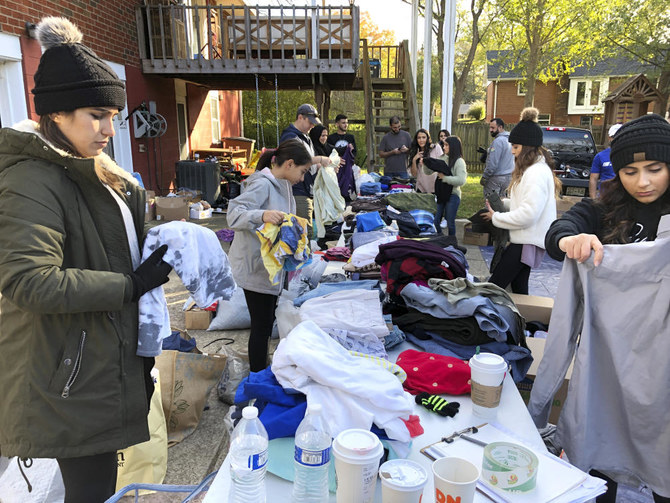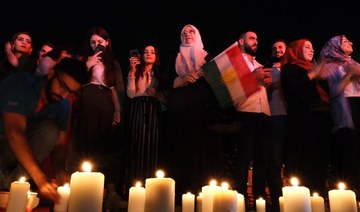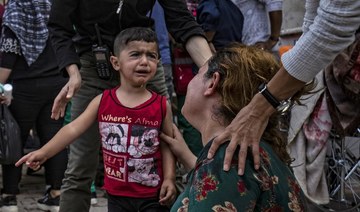NASHVILLE, Tennessee, United States: When President Donald Trump abruptly announced plans to withdraw American troops from northern Syria last month, Nashville’s city hall and a bridge below the downtown skyline lit up in the green, yellow and red of the Kurdish flag.
In the largest Kurdish community in the US, outraged protesters near Nashville’s federal courthouse draped themselves in the same colors and decried the deadly Turkish attacks that ensued in Syria. Chants of “I believe in Kurdistan” rang through the stands of a minor league soccer game
Feeling betrayed by the US abroad is nothing new for the Kurds, one of the largest groups of people without a state, estimated at 25 million to 35 million worldwide. But the US contingent, estimated at 40,000 — 15,000 in Nashville — has been shaken to see its homeland attacked by Turkey and its people pushed out of Syria.
Kurds have protested and prodded politicians, spurring some Trump-aligned officials to criticize the president’s decision. But many have felt largely helpless to aid their homeland as images of death and despair invade their social media feeds.
Yearning to do something constructive, Silav Ibrahim and other Nashville Kurds started collecting donations for Kurds who fled Syria to a camp in Iraq. Their initial efforts, coupled with donations from Kurds in Dallas, have yielded hundreds of boxes of clothes, medical supplies and more.
“We can’t do much,” Ibrahim said. “We can keep protesting and we will continue to do that. We will continue to write letters to our congressmen and women. But we wanted to really be able to at least collect something, do something where we can help those who are fleeing their homes.”
With their land divided among Iraq, Iran, Turkey and Syria, the first wave of Kurds arrived in Nashville in the 1970s after the collapse of a Kurdish uprising in Iraq, according to the Tennessee Kurdish Community Council. More followed as refugees after the first Gulf War and the war in Iraq; others have since relocated because of conflict in Syria.
Abroad, Kurds have been US allies against the Daesh group for several years, losing 11,000 fighters in those efforts in Syria. Syrian Kurdish forces supported by about 1,000 American troops had held about a fourth of Syria’s territory.
Trump initially ordered all troops out of Syria last month. Three days later, Turkey launched its offensive with heavy bombardment along the frontier. The Trump administration then decided to keep a force in place, which Trump said was to protect oil infrastructure.
Sekvan Benjamin Mohammed said he served as an interpreter and adviser to US special forces during the Iraq War, among other deployments in the 2000s. He said Kurds deserve assurances that the US has their backs in return.
“(Trump’s) allowing a group of innocent people being killed and gassed over an oil field,” said Mohammed, a 42-year-old who has multiple Nashville-area businesses. “What kind of humanity is that?”
A mosque, markets and restaurants make up the shopping center at the heart of Nashville’s Little Kurdistan. It’s usually packed for Friday services at the Salahadeen Center.
At the mosque, barbershop owner Adnan Abdulkader said he felt backstabbed by Trump’s pull-out decision and subsequent declaration that Kurds are “no angels” who have “a lot of sand to play with.”
“It’s still like entertainment for him. It’s like he still thinks he’s running a TV show,” Abdulkader said. “You’re messing with people’s lives.”
Though Nashville tilts progressive, the state is firmly Republican. And Tennessee’s political leaders have had tumultuous relationships with immigrant communities, particularly in the Trump era.
Republican Sen. Marsha Blackburn has supported Trump’s immigration policies but broke ranks to criticize the troop pull-back. She has asked the administration to investigate whether the Turks violated a cease-fire and wants tough economic sanctions if they did.
Meanwhile, Tennessee’s Republican-led Legislature has so far failed in its challenge of the federal refugee resettlement program, which brought many Kurds to Nashville. The Trump administration has cut the number of refugees to 18,000 nationally next year.
About 500 refugees were resettled in Tennessee last year under the program, down from a high of about 2,000 in 2016 and an annual average of less than 1,000, according to court testimony.
Some Kurds have been deported under Trump’s immigration policies, said Zaid Brifkani, a Nashville doctor who heads the Kurdish Professionals network.
“When you are part of an administration that is taking active measures against immigration, and when we are a majority population of immigrants, then there is going to be some disconnect between us as a community and the politicians that represent us because we feel like they won’t be able to adequately address our concerns,” Brifkani said.
Help isn’t just coming from within the Kurdish community.
At the Nashville donation drive, Lee Lohnes, an Army veteran who served in Iraq alongside Kurdish translators in the 2000s, boxed clothes to ship to displaced Kurds overseas. He wondered aloud how the US will recover in the Middle East.
“It’s just the greatest act of betrayal,” said Lohnes, an IT manager. “I can’t think of much worse. I’m doing my part, at least, to try to help them in any way I can.”
Kurds in US struggle with distance amid Syria crisis abroad
Kurds in US struggle with distance amid Syria crisis abroad

- Feeling betrayed by the US abroad is nothing new for the Kurds, one of the largest groups of people without a state, estimated at 25 million to 35 million worldwide
- the US contingent, estimated at 40,000 — 15,000 in Nashville — has been shaken to see its homeland attacked by Turkey and its people pushed out of Syria
Hindu-Muslim divisions sway voting in Indian district scarred by deadly riots

- Villages are largely self-segregated by religion in and around Muzaffarnagar in the most populous Uttar Pradesh state
- Violent clashes broke out in 2013 after two Hindus stabbed Muslim youth to death, accusing him of harassing their sister
MUZAFFARNAGAR: Hindu-Muslim enmity made way for peace in an Indian district that saw deadly riots a decade ago but religious divisions still influence residents who voted on Friday in general elections in which Hindu nationalism is a key theme.
Villages are largely self-segregated by religion in and around Muzaffarnagar district, in the most populous northern state of Uttar Pradesh, but people say there is no longer tension between the majority Hindu and minority Muslim communities.
Violent clashes broke out here in 2013 after two Hindus stabbed a Muslim youth to death, accusing him of sexually harassing their sister. They were later beaten to death by a Muslim mob, which sparked riots that killed about 65 people, mostly Muslims, and displaced thousands.
Violence has not returned to the district known as the country's sugarcane-belt, but political divisions remain as Hindus typically vote for Prime Minister Narendra Modi's Bharatiya Janata Party (BJP) and Muslims for the opposition.
Modi's government has "controlled Muslims", said Ramesh Chand, a Hindu biscuit baker in Kairana city near Muzaffarnagar.
Critics accuse the nationalist BJP of targeting India's 200 million minority Muslims to please their hardline Hindu base - charges they deny.
Modi is widely expected to win a third term on the back of strong growth, welfare and his personal popularity despite some concern about unemployment, price rises and rural distress.
Chand said Modi had improved security in the region. "We can live in peace, whether or not we have jobs ... We can sleep with our doors open."
There were opposing views too.
In Jaula village, sugarcane farmer Mohammed Irfan, 50, said Modi's "high-handedness against Muslims" as well as unemployment and inflation were major reasons for him voting for the opposition Samajwadi Party.
Uttar Pradesh elects 80 lawmakers to the 543-member lower house of parliament, the most among all states, and a strong showing here is critical to the nationwide outcome.
Support for Modi was visible in Kutba Kutbi village, the epicentre of the 2013 riots.
Although there is "brotherhood" between the two communities now, nearly all Muslim families left the village after the riots, said Vinay Kumar Baliyan, 43, a farmer who said he supports Modi for promoting economic growth and raising India's stature globally.
But Irfan said Muslims are expected to vote in larger numbers this time as Eid celebrations this month brought many migrant workers and students home.
After Pakistan alert, WHO likely to issue wider warning on contaminated J&J cough syrup

- The UN health body said it puts out global medical product alerts to ‘encourage diligence’ by authorities
- The WHO this week sent out alert on five batches of contaminated cough syrup ingredients found in Pakistan
LONDON: The World Health Organization is likely to issue a wider warning about contaminated Johnson and Johnson-made children’s cough syrup found in Nigeria last week, it said in an email.
Nigeria’s regulator recalled a batch of Benylin paediatric syrup last Wednesday, having found a high level of diethylene glycol in the product during routine testing.
The contaminant, alongside another closely related toxin, ethylene glycol, has been linked to the deaths of more than 300 children in Cameroon, Gambia, Indonesia and Uzbekistan since 2022, though there is no evidence that these incidents are linked with the latest recalls.
The UN health body said it puts out global medical product alerts to “encourage diligence” by national authorities and was likely to do so in this instance, “subject to confirmation of certain details from parties.”
The recalled batch of Benylin syrup was made by J&J in South Africa in May 2021, although Kenvue now owns the brand after a spin-off from J&J last year.
J&J has referred requests for comment to Kenvue. In an emailed statement on Friday, Kenvue said it had carried out tests on the batch recalled by Nigeria and had not detected either diethylene or ethylene glycol.
“We continue to work closely with health authorities and the WHO and are engaging with NAFDAC to understand their test results, including verifying the authenticity of the sampled product, the testing methodology used, and results reported by the agency,” the statement added.
Since Nigeria’s recall, five other African countries have also pulled the product from shelves — Kenya, Rwanda, Tanzania, Zimbabwe and South Africa, where the drug was made.
South Africa’s regulator has also recalled another batch of the syrup, which is used to treat coughs, hay fever and other allergic reactions in children.
Diethylene glycol is toxic to humans when consumed and can result in acute kidney failure, although there have been no reports of harm in the latest incident.
RAW MATERIALS
In the 2022 cases, the contamination in the syrups came from the raw materials used by manufacturers in India and Indonesia.
The WHO said it was collaborating with both the manufacturer and regulatory authority in South Africa to investigate the Benylin paediatric syrup, and had information on the source of the ingredients used. Kenvue has previously said it tested its ingredients before manufacture.
The agency said the possibility that the syrup was counterfeit was also “under consideration as part of investigations.”
Earlier this week the WHO sent out a separate alert on five batches of contaminated cough syrup ingredients found in Pakistan that appeared to have been falsely labelled as Dow Chemical products.
It was the first alert the WHO has sent on excipients — elements of a medicine other than the active pharmaceutical ingredient — rather than finished products, the agency confirmed on Friday.
The batches of propylene glycol were contaminated with ethylene glycol.
“It was critical for WHO to also alert manufacturers that may have been procuring this material to exercise more caution,” a WHO spokesperson said by email.
Propylene glycol is not an ingredient in Benylin paediatric syrup, a Kenvue spokesperson said on Friday.
Polish flag carrier LOT cancels Friday flights to Tel Aviv and Beirut, PAP reports

- Decisions about future flights would be made on an ongoing basis
WARSAW: Polish national airline LOT canceled flights on Friday to Tel Aviv and Beirut due to the unstable situation in the region, a spokesperson was quoted as saying by state news agency PAP.
“Today’s flight 151/152 to Israel from Warsaw and to Beirut 143/144 have been canceled,” Krzysztof Moczulski told PAP. He said decisions about future flights would be made on an ongoing basis.
French police arrest man who threatened to blow himself up at Iran’s Paris consulate

- Police verifying man’s identity and trying to determine whether he had weapons
PARIS: A man who had threatened to blow himself up at Iran’s consulate in Paris was arrested by police, a police source said.
French police earlier cordoned off the Iranian consulate, Reuters reporters saw, and did not immediately confirm finding any weapons.
A police source told Reuters the man was seen at about 11 am (0900 GMT) entering the consulate, carrying what appeared to be a grenade and explosive vest.
A Paris police official told The Associated Press that officers were verifying the man’s identity and trying to determine whether he had weapons.
Police earlier said they were at the scene and asked the public to avoid the area but provided no further details.
Service was interrupted on a nearby metro line for security reasons, the RATP metro company said.
A police cordon remained in place on Friday afternoon, but traffic was resuming in the area.
A person at the Iranian embassy who responded to a call from Reuters declined to provide any information on the situation.
It was unclear whether the incident had any link to the escalating tensions between Iran and Israel.
Earlier on Friday, explosions echoed over the Iranian city of Isfahan in what sources described as an Israeli attack, but Tehran played down the incident and indicated it had no plans for retaliation — a response that appeared gauged toward averting region-wide war.
The incident also comes as Paris is gearing up to host the summer Olympics.
* With Reuters and AP
Blinken says US ‘not involved in any offensive operation’

- ‘All I can say is for our part and for all the members of the G7 our focus is on de-escalation’
CAPRI, Italy: US Secretary of State Antony Blinken on Friday refused to comment on reports of an attack by Israel on Iran, beyond saying Washington was “not involved in any offensive operation.”
Speaking to journalists after a meeting with G7 counterparts in Italy, he declined to answer repeated questions about explosions in Iran, and reports that Israel had carried out retaliatory strikes.
“I’m not going to speak to these reported events... All I can say is for our part and for all the members of the G7 our focus is on de-escalation,” Blinken told a press conference on the island of Capri.
“The US has not been involved in any offensive operation,” he said.
Speaking to reporters earlier, G7 host Antonio Tajani, the foreign minister of Italy, said Washington had been informed in advance of the strikes, without giving details.
“The United States were informed at the last moment,” he said, adding that “it was just information” passed on — without saying who by.
The reports dominated the G7 Friday, with Tajani forced to change the agenda, but little public information emerged.
In its final statement, the Group of Seven ministers said: “In light of reports of strikes on April 19th, we urge all parties to work to prevent further escalation. The G7 will continue to work to this end.”
Israel had warned it would hit back after Iran fired hundreds of missiles and drones at Israel almost a week ago, in retaliation for a deadly strike — which Tehran blamed on its foe — that levelled Iran’s consular annex at its embassy in Syria.



















